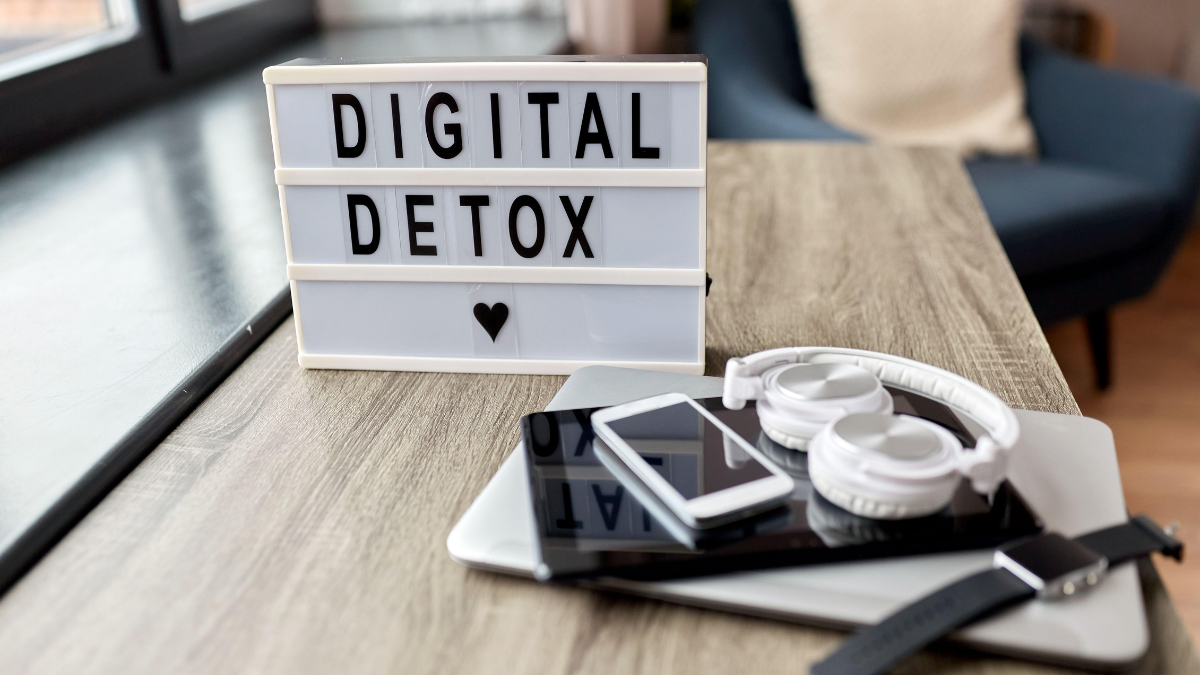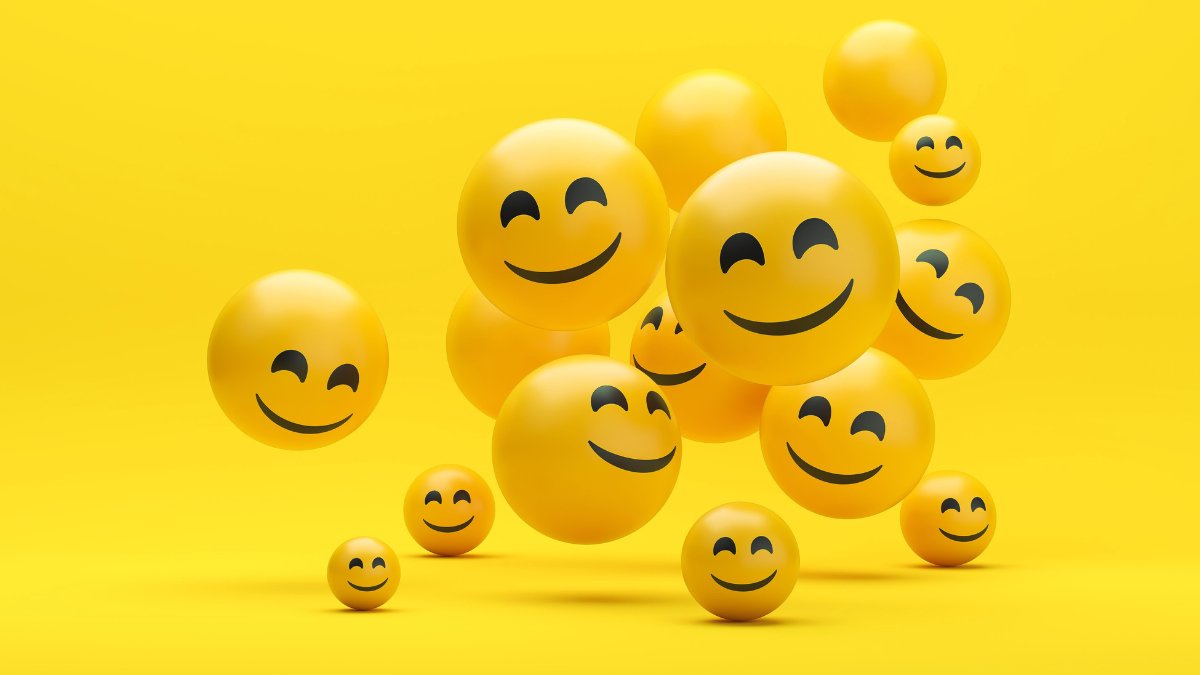When was the last time you went a full day without checking your phone? Or a meal without scrolling social media between bites? If your screen time report makes you cringe, you’re not alone. Most of us—whether students, professionals, or creatives—are constantly plugged in, replying to notifications, emails, and doomscrolling news feeds. It’s no wonder we feel drained, distracted, and disconnected.
That’s where a digital detox comes in.
A digital detox isn’t about throwing your phone into the ocean. It’s about hitting pause on digital overload to reset your brain, improve focus, and reconnect with what truly matters—your peace, your productivity, and your people.
In this post, we’ll explore the power of a 7-day digital detox, why you need it, how to do it, and what to expect along the way. By the end, you’ll have a complete plan to reduce screen time, boost mental clarity, and live a more mindful life—without giving up your tech forever.
Table of Contents
What Is a Digital Detox?
A digital detox is a conscious break from digital devices like smartphones, tablets, laptops, TVs, and even smartwatches. It means stepping away from social media, emails, news apps, streaming platforms—anything that keeps your eyes glued to a screen.
The term gained traction in the early 2010s as psychologists, wellness experts, and tech insiders began warning about the effects of digital overstimulation. Since then, the idea of temporarily “unplugging” has grown into a powerful wellness movement.
In simple terms, a digital detox helps you reclaim your attention and reset your nervous system by reducing the noise of constant notifications and digital distractions.
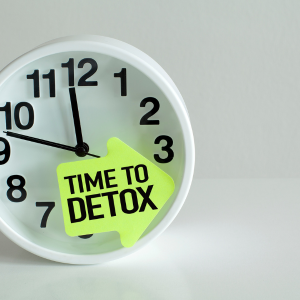
Causes of Digital Overload
Why do we even need a digital detox? Because digital overload is real, and it’s caused by more than just screen time.
Some major contributors include:
- Constant Connectivity: We’re always “on.” Emails, messages, and DMs never stop.
- Fear of Missing Out (FOMO): Social media triggers anxiety when we see others living their “best life.”
- Dopamine Loops: Apps are designed to be addictive, keeping us scrolling for hours.
- Work-Life Blur: Remote work and always-available culture make it hard to log off.
- Mindless Habits: Picking up your phone becomes automatic, even when you don’t need it.
These habits sneak up gradually, leading to fatigue, poor focus, anxiety, and even burnout.
Benefits of a Digital Detox
Taking a digital detox—even for just a week—can significantly impact your mind, body, and relationships.
Here are some major benefits:
🌿 Mental & Emotional Health
- Improved focus and attention span
- Reduced anxiety and stress
- Better sleep quality without late-night screen glow
- Improved mood and decreased feelings of comparison or FOMO
💡 Productivity & Creativity
- Clearer thinking and deeper work
- More time for hobbies and personal growth
- Boost in creativity due to reduced noise
🤝 Relationships & Social Connection
- More presence with loved ones
- Better communication in real life
- Stronger boundaries with work and technology
🧠 Physical Health
- Less eye strain and fewer headaches
- Improved posture from less screen slouching
- More energy from real rest and offline breaks
Even short digital detox periods can “rewire” your brain for better focus and lower stress levels. It’s like a mental declutter session—just like you’d tidy your home, you tidy your mind.
The Impact of Digital Overload on Daily Life
Technology can be empowering, but without limits, it can silently chip away at our quality of life.
Here’s how digital overload might be affecting you daily:
Morning to Night Screen Spiral
- You wake up and immediately check your phone.
- At work or school, you bounce between emails, tabs, and chat apps.
- In the evening, you binge-watch or scroll till late.
- Sleep suffers, and you wake up tired, and the cycle continues.
Work & Study Disruptions
- Constant pings disrupt focus.
- Multitasking reduces deep work and creativity.
- Mental fatigue builds from too many micro-decisions.
Emotional Drain
- You feel anxious after scrolling through news or social feeds.
- Social comparison lowers self-worth.
- Doomscrolling at night leads to restlessness.
Relationship Friction
- Phones interrupt meals, conversations, and shared experiences.
- You may feel more connected to virtual friends than to people around you.
It doesn’t have to be this way. A digital detox helps you reset these patterns.
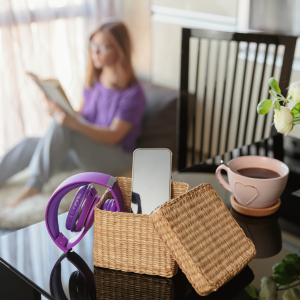
Signs You Might Need a Digital Detox Right Now
- You Check Your Phone Without Thinking. You open your phone “just to check” and suddenly 20 minutes are gone. That’s a sign of autopilot use.
- Your Sleep Is Off: Struggling to fall asleep or waking up tired? Late-night screen time might be messing with your rest.
- You Feel Anxious When Disconnected. If being offline makes you uncomfortable or restless, that’s a red flag that your brain’s hooked on constant input.
- You Can’t Focus on One Thing. Reading a book or having a full conversation feels harder than it used to. Your attention is scattered.
- You’re Always Tired or “Mentally Foggy.” Endless scrolling overloads your brain, leaving you drained without realizing why.
How to Prepare for a Successful Digital Detox Challenge
- Set Your Why
Figure out the main reason you want a break—less stress, better focus, more sleep? A clear reason keeps you motivated. - Pick What to Detox From
You don’t need to quit all tech. Choose what feels right—maybe social media, streaming, or just no screens after dinner. - Let Others Know
Tell friends or coworkers so they don’t expect quick replies. It also helps you stick to your plan. - Turn Off Notifications
Silence those alerts! Less buzzing means fewer distractions and more peace. - Plan Fun Offline Stuff
Have a few activities ready, like walking, reading, or cooking. That way, your detox feels enjoyable, not like punishment.
How Screen Time Affects Your Brain and Body
- Dopamine Loops Keep You Hooked. Apps trigger quick hits of dopamine, training your brain to crave more, even if it’s not good for you.
- Blue Light Messes With Sleep. Screens block melatonin, your sleep hormone, making it harder to fall into a deep rest.
- Neck, Back, and Eye Strain Are Real. Long hours staring down or focusing on tiny text hurt your posture, muscles, and eyes.
- Stress Levels Go Up Constant notifications spike cortisol, your stress hormone. Your body stays tense even when you’re not aware of it.
- Less Time for Movement or Real-Life Joy. More screen time often means less exercise, fresh air, or personal connection—all key for wellness.
Simple Daily Habits to Reduce Screen Time Without Going Offline
- Use Grayscale Mode. Turning your screen black and white makes apps less tempting to scroll endlessly.
- Take Micro Tech Breaks: Step away for five minutes every hour—look outside, stretch, or breathe.
- No-Phone Zones Keep your phone out of the bedroom or off the dinner table.
- Replace One Scroll Session Swap one social media check with reading a book, journaling, or calling a friend.
- Limit Notifications: Turn off non-essential alerts. Less buzz = fewer distractions.
How to Do a 7-Day Digital Detox (Step-by-Step Guide)
You don’t have to disappear into the woods to do a digital detox. Here’s a simple 7-day plan designed for busy people who want to reset without quitting life.
🔄 Day 1: Audit Your Screen Time
- Check your phone’s screen time report.
- Note which apps eat up most of your time.
- Identify your “trigger times” (e.g., right after waking up).
Goal: Awareness. You can’t change what you don’t measure.
🔕 Day 2: Turn Off Non-Essential Notifications
- Disable push alerts for social media, shopping, and news apps.
- Keep only essential ones like calendar or messages.
- Silence your phone during work or meals.
Goal: Create mental space by stopping the constant buzzing.
📵 Day 3: Set Screen-Free Zones
- Declare your bedroom and dining area screen-free.
- Charge your phone outside the bedroom.
- Use analog tools like clocks or journals.
Goal: Protect rest and relationships.
🧘 Day 4: Morning & Evening Rituals (Without Screens)
- Start and end your day tech-free for 30–60 minutes.
- Try reading, journaling, stretching, or just doing nothing.
Goal: Rebuild mindfulness and focus.
🎯 Day 5: Replace Scroll Time with Soul Time
- Replace 1 hour of screen time with something nourishing:
- Walks
- Meditation
- Creative hobbies
- Face-to-face convos
Goal: Fill the time gap with meaning.
📚 Day 6: One Full Offline Activity
- Do something offline for at least 2–3 hours:
- Take a day trip
- Deep clean your space
- Try a new recipe
- Go analog (puzzles, books, sketching)
Goal: Experience the joy of being present.
🧘♂️ Day 7: Reflect & Reboot
- Journal what you learned.
- Which habits helped most?
- What do you want to carry forward?
Goal: Make your digital detox a new starting point.
Maintaining Digital Balance After Your Detox Journey
- Set Daily Screen Limits
Use app timers or built-in phone settings to keep your screen time in check. A few hours a day is plenty—you don’t need to be online all the time. - Keep Tech-Free Times or Zones
Stick to no-phone meals, quiet mornings, or screen-free bedrooms. Small rules like these help you stay grounded in real life. - Use Tech With Purpose
Before opening an app, ask yourself: “Why am I doing this?” Scroll with intention—not out of habit. - Unplug Regularly
Schedule short digital breaks weekly. Even one unplugged afternoon can recharge your brain and refresh your mood. - Check In With Yourself Often
Every now and then, pause and ask: “Is my tech use helping or hurting me right now?” That one question keeps your habits in balance.
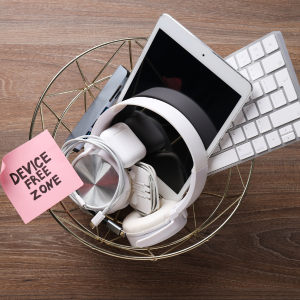
Why You Need a Digital Detox in Today’s Hyperconnected World
- You’re Always Connected, Rarely Present. Digital technology ensures we’re always reachable, but at what cost? Constant pings from emails, messages, and notifications split our attention and rob us of the ability to be present. Whether you’re with loved ones or working on a task, you’re mentally pulled in multiple directions.
- Screen Time is Affecting Mental Health. High levels of digital engagement, especially with social media, are linked to anxiety, depression, and loneliness. The more we scroll, the more isolated we often feel. Taking breaks can improve mood, reduce stress, and help restore emotional well-being.
- Your Brain is overloaded. Information is coming at you from all directions—news alerts, social feeds, videos, memes, and work messages. This never-ending stream leads to cognitive fatigue, poor concentration, and burnout. Your mind needs space to think and rest.
- Sleep Disruption from Blue Light Exposure Can Occur When Staring at screens late into the night, disrupting your body’s natural rhythms. Blue light suppresses melatonin, making it harder to fall asleep. Less sleep means more irritability, low energy, and weaker focus the next day.
- Digital Comparison Breeds Insecurity. Watching others’ highlight reels online can skew your perception of reality. You start to feel behind or not good enough. A detox helps break the cycle of comparison, allowing you to appreciate your own life more authentically.
- Addiction is Designed into the Platforms. Apps are built to keep you hooked. The infinite scroll, dopamine-triggering likes, and algorithm-driven content loops make it hard to stop. The more time you spend, the more attention companies profit from, while you lose peace of mind.
- You’re Losing Touch with Real Connections. As digital communication increases, real-world interactions often decline. A meaningful conversation face-to-face builds connection, trust, and empathy—something that texts and likes can’t replicate.
- Multitasking Reduces Productivity Jumping between apps and tabs might feel productive, but it harms focus. Studies show that multitasking lowers IQ temporarily and increases time spent on tasks. Deep work requires deep focus—something a detox can help you regain.
- Constant Alerts Interrupt Creative Thinking. You need uninterrupted time for ideas to develop. When your attention is constantly hijacked by notifications, creativity and innovation take a back seat.
- A Digital Detox Creates Space to Reconnect. Taking time off from screens allows you to reconnect with yourself, your environment, and others. It’s not about rejecting technology; it’s about reclaiming balance.
Common Myths About Digital Detox
Let’s bust a few myths:
- Myth 1: You have to go completely offline.
✅ Truth: You can customize it. Even small changes help. - Myth 2: It’s only for tech addicts.
✅ Truth: Anyone can benefit, from students to CEOs. - Myth 3: You’ll miss out.
✅ Truth: You’ll gain clarity, peace, and real connection.
How to Reconnect With Yourself in a Distracted World
- Try Morning Silence. Don’t grab your phone right after waking up. Sit with your thoughts, stretch, or sip tea quietly.
- Write It Out Journaling clears your mind and helps you reconnect with what you truly feel or need.
- Practice Mindful Breathing. Just 5 minutes of deep, focused breathing can reset your nervous system.
- Spend Time Alone On Purpose: Take a solo walk or sit in nature without music or podcasts. Let your mind wander.
- Ask Yourself Real Questions: “How am I doing today?” or “What do I need right now?”—you’ll be surprised by the answers.
Conclusion: Your Mind Deserves a Break
You don’t need to escape to a cabin or delete every app to feel human again. A digital detox is a flexible, personal way to take back control of your time, your energy, and your attention.
Start small. Stay curious. Let this 7-day challenge be your reboot, not your retreat.
Your phone will still be there when you’re done. But you might not need it as much. You’ll be more mindful, more focused, and more in tune with yourself.
Let your mind breathe. Reclaim your life—one day at a time.
Ready to try this digital detox challenge?
Let us know how it goes in the comments below. Share your favorite tip—or invite a friend to try it with you! 💬
Frequently Asked Questions (FAQ)
Q1: What is a digital detox in simple terms?
A: A digital detox is a short-term break from screens and online distractions to help reset your brain and reduce stress.
Q2: What causes digital overload?
A: Constant notifications, endless scrolling, fear of missing out, and addictive app design all contribute to digital overload.
Q3: How can a digital detox improve my life?
A: It can boost focus, reduce anxiety, improve sleep, and help you reconnect with real life and real people.
Q4: Is digital detox scientifically proven to work?
A: Yes. Studies show reduced screen time improves sleep, lowers cortisol (stress hormone), and boosts attention span.
Q5: How long does it take to see results from a digital detox?
A: Most people feel benefits within just a few days—better sleep, less stress, more clarity.
Q6: Can anyone try a digital detox, or is it only for certain people?
A: Anyone can try it. It’s safe and effective for students, professionals, parents, and everyone who uses tech.
Q7: What’s the best way to start a digital detox today?
A: Begin by turning off non-essential notifications and setting one screen-free zone at home.

